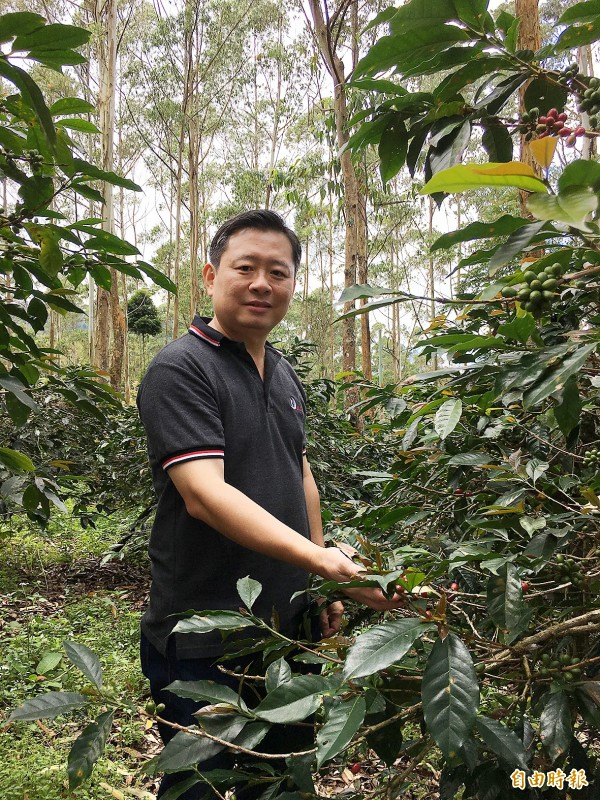《TAIPEI TIMES》 Businesses should put down roots, garment maker says

PT Sinar Majalaya Lestari president Ko Pai-kuan poses for a photograph at a coffee farm owned by his family in Bandung, Indonesia, on March 28. Photo: Kuo Chia-erh, Taipei Times
A well-established industry cluster of Taiwanese-founded textile and garment suppliers has existed in Bandung, Indonesia, for more than three decades. PT Sinar Majalaya Lestari president Ko Pai-kuan, the second-generation leader of the family company, discussed his experience of reshaping the traditional business and exploring new opportunities in the Indonesian market in an interview with ‘Taipei Times’ staff reporter Kuo Chia-erh on Wednesday last week
/
Taipei Times (TT): How did your family start PT Sinar Majalaya Lestari (興南印染)?
Ko Pai-kuan (柯百觀): My father came to Indonesia in 1982 and built his first knit fabric plant in 1992. I joined his management team two years later, serving as a factory director. As more than 90 percent of the products made at our plant were sold to global customers, we had to overcome many challenges during the 1990s, especially the 1997 Asian financial crisis and the May 1998 riots in Indonesia.
In 2007, I founded my own garment brand, Top In Style (蒂斯成衣), and began to outsource manufacturing through partnerships with local suppliers. I established another plant for dyeing and printing fabrics in the following year.
TT: What is the difference between your generation and your parents’ generation’s business model?
Ko: When Taiwanese textile makers began to pour investments into Indonesia decades ago, they were aided by technologies and orders from global brands, as well as significantly lower labor costs in the country. However, after the quota system for the global textile and clothing industry was abolished in 2005, new Taiwanese businesspeople sought opportunities in Indonesia, eyeing the country’s huge Muslim population.
About 85 percent of the country’s 260 million residents are Muslims. Previously merely a production base, Indonesia now attracts people from neighboring Southeast Asian nations and the Middle East who come to purchase Islamic clothing.
My company has been busy shifting its focus to Indonesia’s domestic market since 2010. In the past, 40 to 50 percent of our products were made for global brands, such as Nike Inc and Adidas AG. Now, nearly 85 percent of our goods are sold to Indonesian customers through diverse channels. Islamic clothing contributes 50 percent of those domestic sales.
TT: Why did you choose to expand sales channels in the Indonesian market instead of continuing supplying products to global clients? Is there another reason besides a broad customer base?
Ko: We took into account the operational efficiency of our plants when we decided to reduce reliance on brand customers. As a supplier in global garment supply chains, you usually do not have many options.
For example, your production lines might need to make very similar types of fabrics or clothing. You also have to meet strict quality standards set by brand clients, ensure product stability and push down costs. That is the reason why some Taiwanese companies continue to seek new overseas production bases.
By contrast, we could choose what to produce if we made the Indonesian domestic market our target customer. That gives us a more diversified product portfolio and a more flexibility in manufacturing. We can supply various kinds of textiles and garments for different groups in the country.
However, there are some disadvantages to us directly selling products in Indonesia. Without stable orders from global brands, we have not only had to expand distribution channels all by ourselves, but we also face higher default risk.
TT: Some Taiwanese garment makers, such as Makalot Industrial Co (聚陽實業), have also set up production in Indonesia in light of cheaper labor costs, but their materials might come from outside of Indonesia. How do you manage your material sourcing?
Ko: My company covers the downstream part of a typical garment supply chain, with services ranging from knitting, dyeing and printing to garment making and distribution.
Unlike other Taiwanese textile makers, which are deeply reliant on global customers, we basically purchase yarns from local suppliers in Indonesia, with the aim of ensuring a quick inventory turnover. We might hoard too much yarn if we were to rely on material imports.
TT: What is your strategy for expanding your business in Indonesia?
Ko: Machines are becoming “smart,” but for textile and apparel makers, it is less likely that they will introduce completely automated manufacturing systems, as the industry is labor-intensive.
Thus, the core of our business strategy is to improve management. The technological threshold to enter textile manufacturing is not very high, which means that everyone can tap into the market. To compete with our rivals, we aim to build trust with customers by ensuring product quality and avoiding shipping delays.
Our strategy also has a focus on localization. Usually, Taiwanese-funded textile makers will hire foreign or Taiwanese experts to supervise local workers, but at my plant, we work with all-Indonesian technicians, except for me. Businesspeople should put down roots in their target markets, instead of cutting corners.
TT: Can you share your outlook for the industry?
Ko: I expect Indonesia’s textile industry boom to continue over the next one or two decades. After all, clothing is a basic necessity. The Indonesian market is large and not yet saturated.
We are not very worried about external factors, as there has been an upward trend in consumer purchasing power in Indonesia. In addition, the depreciation of the Indonesian rupiah should offset the impact of rising labor costs in the country.
The Indonesian government is trying to fight bribery and corruption. Its environmental standards for manufacturing industries are also getting stricter. Companies have to comply with rules regarding air pollution and waste management. The local market might experience growing pains because of recent reforms, but in my opinion, you will not fear challenges if you are strong enough.
TT: What are your expansion plans?
Ko: We have 560 employees and a nearly 3 hectare plant in Bandung, with a maximum output capacity of 5 million yards of fabrics per month. We are planning to add an additional 2 hectares of land to the existing plant. The first phase of construction is to be completed by the end of this year. After the expansion, our capacity is expected to increase by more than 50 percent over the coming two years.
新聞來源:TAIPEI TIMES



















